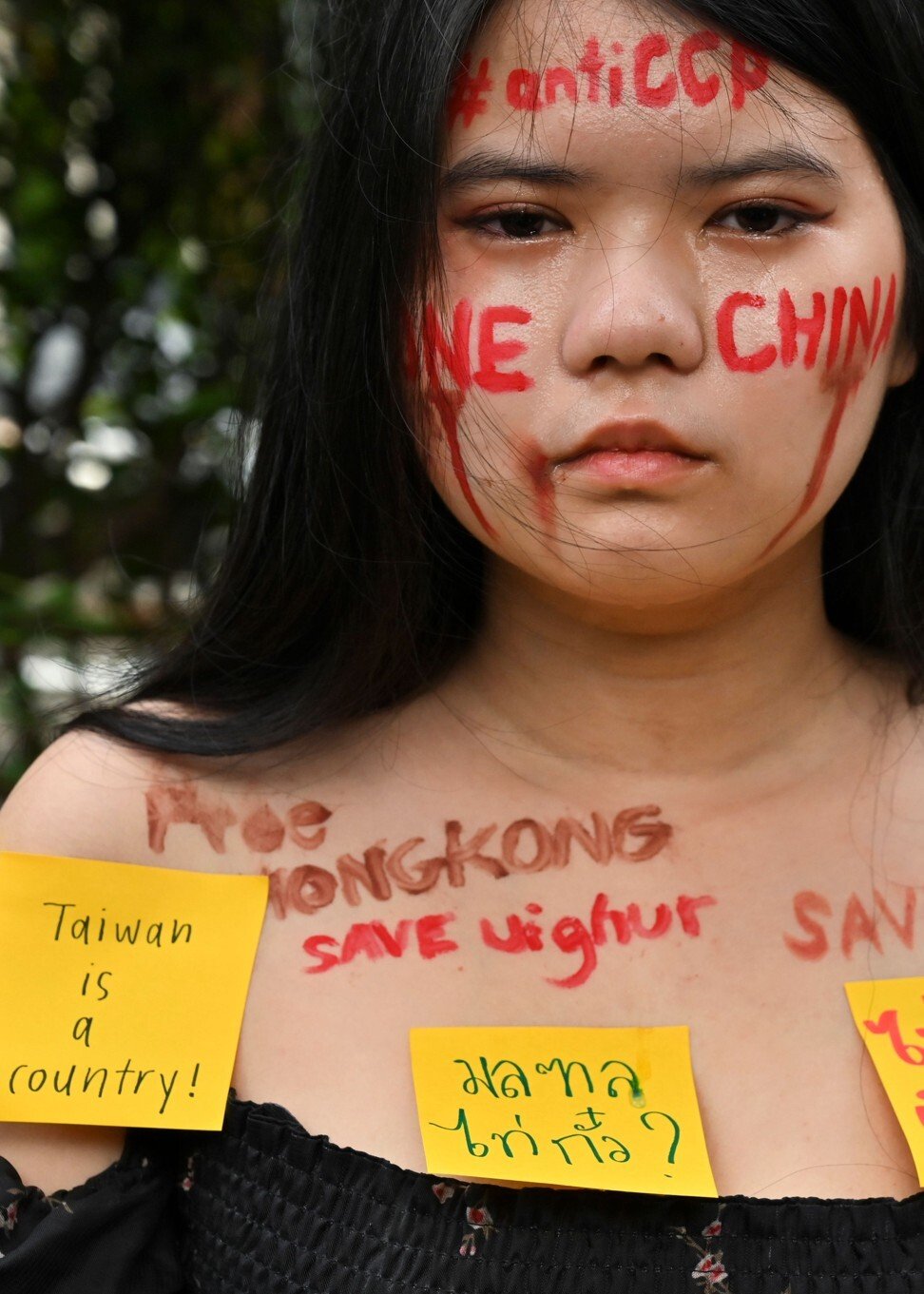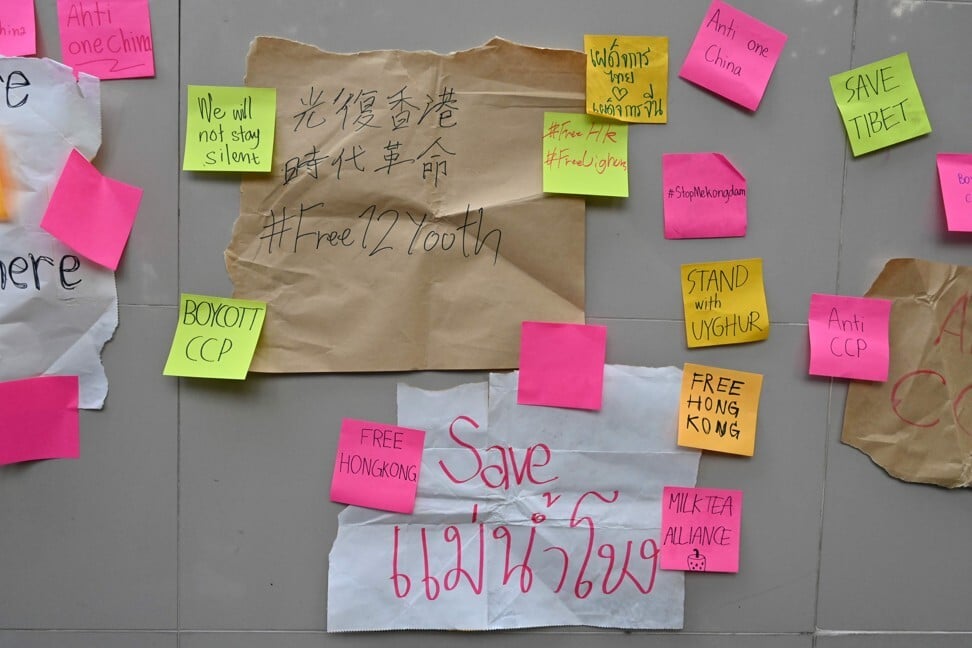
In Thailand, activists mark China’s National Day with demonstration in support of Uygurs and Hong Kong protesters
- Around 20 students from the Anti One China TH group, which supports the Milk Tea Alliance, gathered ‘to show that Beijing’s actions had effects on the world stage’
- The group, which is allied to the organisers of a series of student protests that have rocked Thailand in recent months, also sang the protest anthem ‘Glory to Hong Kong’

Thai university student Napassorn Saengduean commemorated China’s National Day on Thursday by visiting a cinema a short walk away from the Chinese embassy in Bangkok. There, she had her picture taken with a poster for Mulan, the Disney film about a legendary Chinese hero starring Liu Yifei, a Chinese-born American.
But Napassorn was not there for the big-screen depiction of Chinese folklore. On her dress and bare shoulders, she had several Post-it notes with slogans such as “Save Tibet”, “Anti CCP” and “Stand with Uygurs” – joining those who had spoken up against Liu’s backing of the police last year during the anti-government protests that rocked Hong Kong.
Napassorn, a political science student at Bangkok’s Chulalongkorn University, is one of the Thai millennials in their 20s who make up the group Anti One China TH.
She said the group’s main aim, on the 71st anniversary of the founding of the People’s Republic of China, was to raise awareness among Thais that Beijing’s actions – including “the Hong Kong national security law and the human rights abuses in Xinjiang and Tibet” – had effects on the world stage.
On Thursday evening, the group held a small gathering opposite the Chinese embassy, turning a nearby footpath barrier into a so-called Lennon Wall bearing messages in favour of the protesters in Hong Kong, condemnations of Beijing’s actions and support for the Milk Tea Alliance – an internet solidarity movement composed of social media users from Hong Kong, Thailand and Taiwan.
“We believe it is more difficult for democracy in Thailand when we live under the shadow of an authoritarian superpower like China. We understand that political systems are integrated, like networks,” the group said in a statement read out by Napassorn at the gathering.
“In the spirit of the Milk Tea Alliance, we show our solidarity with the people of Hong Kong, Taiwan, Tibet, and the Uygurs, who suffer under Xi Jinping’s oppression.”
China has been accused of detaining at least 1 million Uygurs and other Muslim minorities in internment camps and subjecting them to political indoctrination and forced labour. Beijing has denied the allegations and insisted these camps are “vocational training centres” where people are given education and training to improve their job prospects and counter religious extremism.
At the gathering, around 20 students held placards with political messages, as well as those expressing support for Taiwanese independence and the plight of Uygurs and Tibetans. Books on Uygurs and milk tea candy – a popular confectionery in Asia – were also given away.
Some who attended were carrying pictures referencing the political history of Thailand and China – an image of a man standing in front of a tank was a callback to the Tiananmen Square protests of 1989, while another caricature was in memory of Nuamthong Praiwan, who in 2006 drove his taxi into a tank and later killed himself in a protest against the military coup in Thailand that year.
Anti One China TH is allied to the Free Youth Movement, the organisers of a series of student protests against the government of Prime Minister Prayuth Chan-ocha that have in recent months rocked Thailand with their calls for a new constitution and reform of the monarchy.
Another mass protest is planned for October 14, the anniversary of the 1973 student demonstrations that resulted in the end of the Thanom Kittikachorn dictatorship.
Hold my umbrella #วันไชน่าที่ไม่ใช่วันชาติ #AntiOneChinaTH#MilkteaAlliance pic.twitter.com/caPhjkxSks
— Anti One China TH (@AntiOneChinaTH) October 1, 2020
Speaking to This Week in Asia, Napassorn said the Thai and Chinese models of government were “based on authoritarianism”, and she considered China “a threat” to Thailand in various aspects, including closer ties between the Prayuth administration and Beijing.
As night fell, the group concluded the gathering by singing Glory to Hong Kong, the Hong Kong protest anthem, and held up yellow umbrellas in a reference to the 2014 Occupy Central protests in the city.
“I think when pro-democracy Thais look at China, they see an exaggerated version of their own country, with all its democratic shortcomings,” said James Buchanan, visiting lecturer in Social Science at Thailand’s Mahidol University International College.
“They also know well that China has no interest in seeing Thailand become a democracy, whereas Western countries offer a lot of support and encouragement. They instinctively know that a future fully within China’s sphere of influence will not be the kind of future they want.
“I’m sure China would be happier to see more stability in Thailand, but they have a lot on their plate at the moment and I don’t think Thai protests will be high on their list of priorities. They will also be confident that their good diplomatic relations with Thailand will continue, even if a lot of Thai youth are turning against them.”
